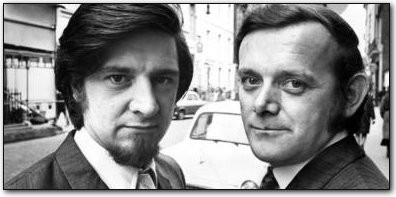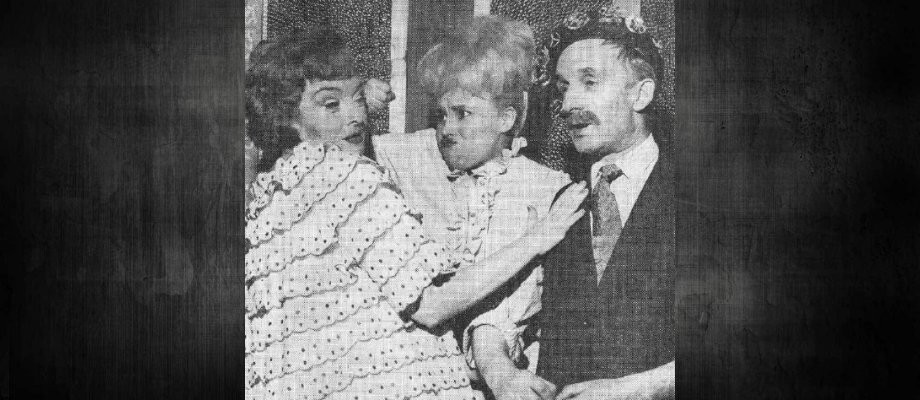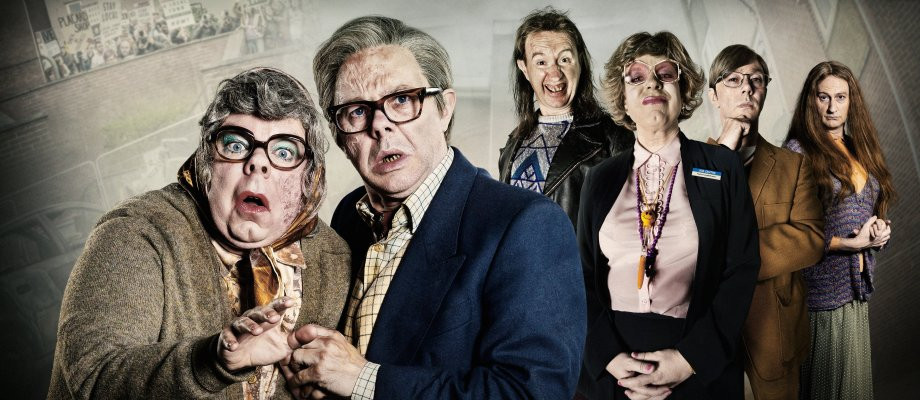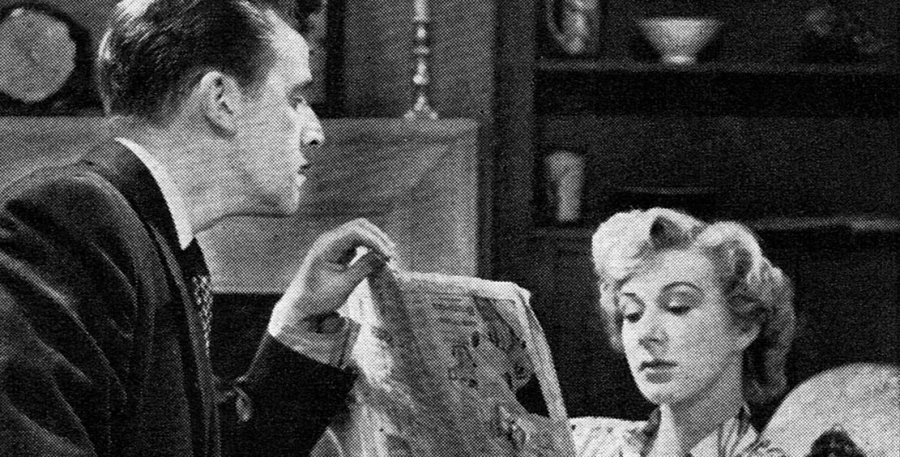
John Esmonde and Bob Larbey
John Esmonde and Bob Larbey have unquestionably been responsible for some of British comedy's best loved programmes. From the comfort of suburbia in The Good Life to the darker world of Mulberry, the writers have given us some of the most memorable characters on television. But success for Esmonde and Larbey didn't come easily and their story is one of how persistence and talent paid off.
The pair first met at grammar school in Clapham, where Larbey was three years ahead of Esmonde. In spite of the age difference the two shared a school trip to Switzerland where they discovered that they shared a similar sense of humour, and it was based on this that they forged their long-lasting friendship. After military service they drifted back into a humdrum civilian life and took mundane, unfulfilling jobs just to make ends meet. They would often meet up for lunch and complain about their dead-end jobs and dream of forging a better way to make a living.
Their mutual enthusiasm for radio and comedy revues inspired them to have a go at writing themselves, and so, each evening they would meet at John's house and hammer out short comedy skits. However, their early offerings were continually rejected and at times they wondered if they were not wasting their time. But perseverance finally paid off and they eventually managed to sell a short one-off radio skit. Encouraged by this the duo wrote more and more material until finally one of their sketches was bought by the BBC for the long-running Dick Emery Show. More commissions for 'Emery' followed and eventually a steady stream of work came their way. They kept their jobs for the first year but eventually the strain of working during the day and writing comedy at night began to take its toll in the form of physical exhaustion. In the end one career was going to have to go, and encouraged by the positive feedback their writing was getting -in particular by people such as Marty Feldman and comedy writer/producer Barry Took, they ditched the day job. It wasn't easy, though, and in particular Larbey's wife was called on from time to time to take over as the family breadwinner when wages were not coming in regularly.
Their next break came when a BBC radio producer asked them if they were interested in writing a half-hour comedy show. They readily accepted the challenge and the result was Spare A Copper, a comedy which, as its title suggests, is about a policeman. The series lasted two seasons and in the process Esmonde and Larbey learned a lot about how to structure thirty minutes of comedy as opposed to the short skits they'd been doing. They also learned a lot about how to create well-rounded sitcom characters.
With the success of Spare Me a Copper on radio, Esmonde and Larbey moved into the world of television sitcom. Their first effort was called Room At The Bottom, the plot of which revolved around maintenance men working at a manufacturing plant. Shown as part of Comedy Playhouse, Room At The Bottom was deemed successful enough by the powers-that-be at the BBC to warrant an entire season of seven episodes. And although it wasn't picked up for a second season, it was a valuable experience and a programme that both writers look back on with pride.
In 1968 the pair scored their first big hit with the comedy Please, Sir! starring John Alderton as newly qualified teacher Bernard Hedges, as he tried to tame the most unruly class at Fenn Street School, 5C. Following on from the success of the 1967 feature film To Sir, With Love, Please, Sir! was an instant hit and ran for a total of 56 episodes becoming the first major sitcom success for the newly formed London Weekend Television. There was a feature film based on the series and a US version-Welcome Back Kotter as well as a sequel series, called The Fenn Street Gang, which ran for an additional 49 episodes on ITV.
In 1972 LWT commissioned another pilot from Esmonde and Larbey entitled Cosmo And Thingy starring Graham Stark. The story was set in prehistoric times, with the entire cast playing humble cavespeople. But LWT were unimpressed and the one-off was only screened the wrong side of midnight and therefore seen by very few viewers. The following year the duo had a minor hit with Bowler, starring George Baker, a series that ran for 13 half-hours. That same year Esmonde and Larbey wrote another one-off sitcom, Football Crazy, which starred Benny Hill regular, Bob Todd. The programme was shown as part of a children's series called Funny Ha Ha.
For their next sitcom Esmonde and Larbey referred back to their national service days. The subject had already been covered successfuly in the Granada produced sitcom, The Army Game-but Esmonde and Larbey's treatment of the subject proved just as popular and Get Some In! starring Tony Selby and featuring Robert Lindsay in his first major TV role, was destined to run for the next three years.
That same year Esmonde and Larbey switched TV channels to create their best remembered sitcom-The Good Life. Drawing on personal experience yet again, Esmonde and Larbey remembered the days when they were stuck in a dead-end job with few prospects to escape the hum-drum of everyday life. "I think it was a good idea." said Bob Larbey in an interview. "We started with the premise of somebody reaching his fortieth birthday. People think of it as one of those milestone ages, the "Oh, God, what have I done with my life? What do I do about it?" That was the premise. In their original draft Tom Good was going to build a yacht and sail around the world, but they then hit on a subject that was far more trendy at that time. "We added the self-sufficiency, which seemed a good idea. It started slowly--bad reviews and low audiences, and then somewhere in the second series it just took off and flew. And it sort of passed into legend for some reason."
One of the reasons the series passed into legend as Larbey puts it is thanks to a brilliant ensemble cast of Richard Briers, Felicity Kendal, Penelope Keith and Paul Eddington. The show may have been intended as a starring vehicle for Briers, but it was Penelope Keith who was soon taking all the plaudits. "Margo (played by Penelope Keith) became hugely popular as a character." said Larbey. "It was always intended as a foursome, because you needed that. The Goods were perfectly funny on their own and while we needed other strong characters, Margo just grew and grew." The Good Life ran for four seasons and the final episode of season was seen by over 12 million viewers. There was a 1977 Christmas special and a special episode, called When I'm 64 filmed in front of one of the show's biggest fans: The Queen.
Following on from The Good Life, Esmonde and Larby wrote another series for Richard Briers in which he starred alongside Michael Gambon. In The Other One, Briers played Ralph Tanner, a rather sad and lonely character due to the fact that he is a compulsive liar. In spite of running to two series, The Other One failed to capture the affection of the British viewing public and was deemed one of Esmonde and Larbey's first failures. In 1977 the duo collaborated on a one-off sketch for Diana Rigg's series Three Piece Suite. Then in 1979 they wrote another ITV comedy, Feet First starring Jonathan Barlow, Jacquie Cassidy and Lee Montague. Curiously, 7 episodes were made but only six of them were ever screened. The following year another less-than-successful sitcom was made starring Sandra Payne, Rodney Bewes and Avril Angers. Just Liz ran for just one series. At this point the duo decided to take a break-from each other. Esmonde went to spend time in Spain while Larbey bought a new home and, suddenly strapped with a hefty mortgage, found himself in need of some cash. The result was that Bob Larbey wrote his first solo project, and what's more it proved to be a huge success.
A Fine Romance starred real-life husband and wife team Judi Dench and Michael Williams. Dench (in her first sitcom) played the part of Laura, a translator by profession who is single and happy to be that way. In order to appease her forever matchmaking sister, Helen (Susan Penhaligon), she goes to a party where she is introduced to Mike, also in his forties, a landscape gardener who Laura sees as short, shy, and nervous. But the pair make a pact to feign interest in one another in order to make an early escape from the party. They soon begin an on-off relationship which eventually blossoms into a fine romance. Bob Larbey didn't think Judi Dench would do the series at first. "The producer and I were trying to cast it, and we batted names back and forth, making endless lists with asterisks and question marks, and he said, "In a dream world, who would you like to play it?" And I said Judi Dench, thinking this is a great classical actress, she wouldn't touch a sitcom with a barge pole. He, bless him, said, "well let's send her a script, she can only send it back." He sent her a script, she phoned him back and said she'd love to do it. The series ran for four seasons between 1981 and 1984. Another of Bob Larbey's early solo projects was adapting The Darling Buds of May for television. "It was a huge success." says Larbey. "I did the first four episodes of that. I adapted two of the books. And, without being mean spirited, I saw some things starting to happen that I didn't particularly want to happen so I quit then. But I did have the advantage of meeting Catherine Zeta-Jones, who played Mariette. I remember the stunned silence as she walked into the rehearsal room!"
It was two years before Esmonde and Larbey collaborated on another sitcom on television. Once again the series failed to score a hit and Don't Rock The Boat starring Nigel Davenport, Sheila White and John Price didn't rock the critics or its audience and didn't go further than the first six episodes. Their next sitcom, Now And Then starring Bernard Holley, Jill Kerman and Marc Gilbey faired a little better extending to two series in 1983 and 1984. However, the series that followed became a big hit. It teamed Esmonde and Larbey up with Richard Briers once more.
In Ever Decreasing Circles, Briers played the awful Martin Bryce, an anally retentive, interfering control freak who tries the patience of all his neighbours and acquaintances but non more so than his long suffering wife, Anne. Penelope Wilton starred alongside Briers as his wife and Peter Egan was the next door neighbour who Anne should have run off with-but never did. Martin wants to help his community and in his zeal heads up about every conceivable local committee. Yet his singular focus on doing good causes Martin to become an incredible bore. When Anne wants to go to see a famed pianist Martin prefers his meetings. Anne may not have heard her music but the series hit the right notes with the British public and it stayed on BBC for four series and a 80-minute special. But Esmonde and Larbey were not finished with successful sitcoms yet, and had another hit in 1986 with Brush Strokes.
Brush Strokes provided a breakthrough on British TV for amiable actor Karl Howman who starred as the amorous wisecracking house painter, Jacko, a genuinely sincere character with a tendency to genuinely fall for the women he pursued, in spite of his reputation as a womaniser. Jacko's real romantic partner was the firm's secretary, Sandra (Jackie Lye), who he was due to marry before turning to best man, Eric (Mike Walling), and telling him, 'I think I've made a terrible mistake...'-she was walking up the aisle at the time.
In 1990 Bob Larbey went solo again for On The Up, a BBC sitcom starring Dennis Waterman, Sam Kelly and Joan Sims. In it, Waterman played Tony Carpenter, a self-made cockney millionaire who is struggling to keep his marriage together with the snobbish Ruth (Judy Buxton). There were three series of On The Up, which ended in 1992. But in 1991 Larbey teamed up with his old partner again for Hope It Rains starring Tom Bell, Holly Aird and Eamon Boland. The series ran for two seasons but was not seen as a great success. Unlike Larbey's next solo project, As Time Goes By.
As Time Goes By reunited Larbey with Judy Dench. The idea for the series was brought to Larbey by the Theatre of Comedy production company and they asked him to see what he could do with it. The premise - of two former lovers reuniting after almost forty years - was right up Larbey's street and the dream casting of Judi Dench as Jean Pargetter and Geoffrey Palmer turned the show into a hit on both sides of the Atlantic enjoying considerable success in the USA. For the first few seasons, the plot revolved around whether or not Lionel and Jean would get back together. "You can do just so much with two people sort of dancing around each other-and the audience knowing that the outcome was going to be a happy one." Said Larbey. "I think the reason that I went on was that they were all so good in it and enjoyed it, and I liked the characters that I'd written. It was a happy time, and we said let's go on, let's make it a character comedy." The show concluded in 2002 with the wedding of Judith and Alistair.
As illustrated, Esmonde and Larbey would often write more than one sitcom for the same actors and their next collaboration, Mullberry (1992-93), was no exception. This was an offbeat fantasy sitcom starring Karl Howman as the mysterious Mulberry, an apprentice Grim Reaper who develops a soft spot for the woman he is supposed to be escorting into the next world. The woman in question in the cantankerous Miss Farnaby, played by Geraldine McEwan. In an attempt to make her last days pleasant, Mulberry gets a job as her servant and his charm eventually wears down the elderly woman's crusty exterior. His affection for her grows to the point where he's hesitant to do the job he's been sent to do. And their next series reunited them once more with Richard Briers. In Down To Earth, Briers plays Tony Fairfax, an Oxford graduate who, upon leaving university, immediately goes to work as a cultural adviser in South America. But a military coup leaves him exiled and penniless and forced to return to a Britain he barely recognises. It was to be John Esmonde and Bob Larbey's last collaboration. In 1995 Esmonde and Larbey decided to call their partnership quits. It was entirely amicable, due mainly to Esmonde's desire to spend more time in Spain. He still lives there and concentrates on writing novels. "It was totally amicable." says Bob Larbey of the split. "We were kind of headed in different directions in our personal lives. John had bought a house in Spain, and wanted to cut down on the work and spend more time there-maybe spend six months here and six months in Spain, which was fine by me. Some years afterward John and I just came naturally to the end of our writing together. The last series we tried was a series called Down To Earth, again with Richard Briers. Unfortunately it didn't work. We didn't write it very well I don't think, so it just ran one series."
Bob Larbey had already experienced working as a solo writer but admits that working without a partner is less fun. "There is no one to bounce ideas off of nor is there a partner to laugh with if something is funny." He also admits that when he and Esmonde worked together there was much more planning and outlining involved in the scripts. On his own, Larbey says he thinks in broad terms, figures out the ending and just goes from there. "We always wrote together in the same room. I've heard of pairs of writers who do scenes each and then meet up and put them together, but that never appealed to us. We rented a series of disgusting little offices and just used to go to work-sit in the same room, talk a lot, drink a lot of coffee. We used to get the story fairly straight first, and then start to ad-lib dialogue. And that was it. Ad-lib it and write it down, and try to remember what you've just been laughing at. That's the hardest part." They rarely disagreed on things, but decided early on that if one of them felt very strongly that a scene wasn't working or a line of dialogue should be taken out, then it would be gone.
In 1995 Bob Larbey wrote My Good Friend starring George Cole, Richard Pearson and Minnie Driver in a well written poignant comedy about old age. His scripts contain the same strengths as the work he did with John Esmonde. They got laughs without resorting to coarse language and, although not every one of their collaborations proved to be a hit, they weren't afraid to experiment. They created characters everyone could relate to and let the laughter flow naturally from the characters and the situation rather than an endless stream of artificial one-liners. "I don't think we ever set out with a master plan of what we wanted to write. We just used to think of ideas that we hoped were funny, and hoped that somebody else found them funny. I think a style just naturally evolves, and I think John and I together and me singly tended to concentrate on characters, to make them character comedies as opposed to situation comedies."
Together and solo, the work of John Esmonde and Bob Larbey has made the world of British comedy a much richer place.
Published on February 20th, 2019. Written by Laurence Marcus (February 17th 2005) for Television Heaven.










